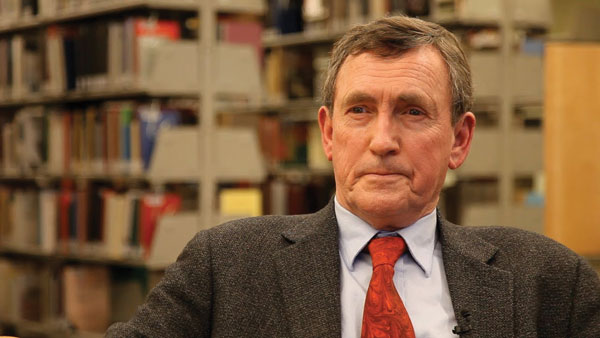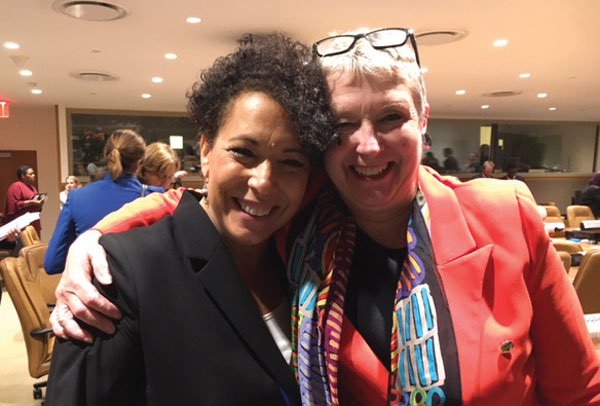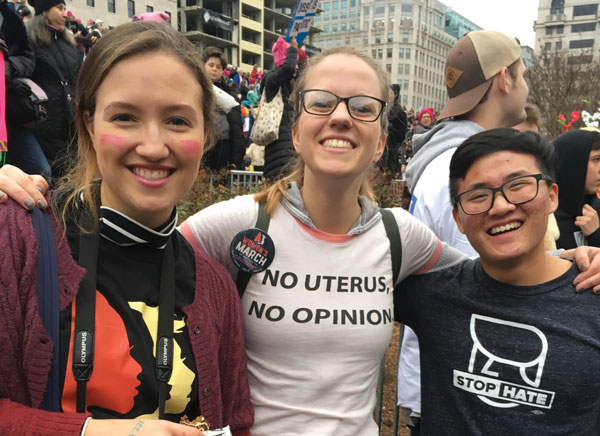(photo by Mark DiOrio)
Personal magic: Adonal Foyle ’98 returns for poetry series
Retired NBA player Adonal Foyle ’98 read from his new book, 31: poems, on March 2 in Love Auditorium as part of the English department’s poetry series.
The soucouyant parades the tarry sky / As trembling in my childhood bed, I lie. These two lines of “Island Witch,” which harken back to Foyle’s imagination while growing up in the Caribbean, highlight how he weaves his identity into his work.
“Poetry continues to be a necessary marker in his life, a fundamental way of making meaning,” said English professor Peter Balakian, who has coordinated the poetry series since 1988. “His poems take on a broad range of experience that include personal relationships, politics and race, life in the NBA, and his childhood.”
Although Foyle left Colgate in 1997 for the NBA, he was committed to graduating. He took a creative nonfiction tutorial with Balakian, faxing the professor installments of his work from stadiums around the country. Throughout his successes as a basketball player, Foyle continued to write.
There in the Chenango Valley where 13 sang my soul to flight, basketball laid siege to my soul.
He even wrote a poem when he retired from the NBA in 2010, reflecting on Colgate, the place that sparked his basketball career and his passion for poetry. Titled, “Love Song to a Game,” it reads, in part: There in the Chenango Valley where 13 sang my soul to flight, basketball laid siege to my soul.
Following Foyle’s reading, Balakian hosted a reception at his home for students and faculty. Said Balakian, “These moments embody something special about Colgate’s liberal arts culture and can bring a personal magic to the learning experience.”
Colgate’s poetry series continued throughout the semester, welcoming Yusef Komunyakaa, Molly McCully Brown, Matthew Cooperman, and Aby Kaupang. The late poet and professor Bruce Berlind started the poetry series in the 1960s. It has been a major part of Colgate’s culture and literary curriculum, bringing poets such as Ted Hughes, Anne Sexton, and Robert Pinsky to campus.
— Melanie Oliva ’18
Waterways were key to Neolithic Transition

Professor Albert Ammerman
In Europe, the transition from hunting and gathering to farming did not happen overnight. But in the western Mediterranean, it happened much faster than anywhere else.
Albert Ammerman, a research professor in the classics department, has developed new insights on factors that caused this change — called the Neolithic Transition, which spanned thousands of centuries, from before 8,000 to after 4,000 BCE — to occur so quickly along the Mediterranean coast. This research is the culmination of projects that Ammerman has been working on in the Mediterranean for decades.
“In 1971, Luca Cavalli-Sforza and I did pioneering work and measured for the first time the overall rate [of Neolithic spread] for Europe as a whole to be about 1 kilometer per year,” Ammerman said. “At the time, we thought the rate in the West Mediterranean might be twice as fast.”
More recent archaeological evidence has shown, however, that the rate of Neolithic spread in the western Mediterranean was even faster than imagined. Between northwest Italy and central Portugal, the rate of spread was 8.7 kilometers per year. The most common explanation is that this happened because the area’s first farmers could use coastal waterways to travel and interact with hunter-gatherers along the way, allowing them to share their knowledge more easily.
Ammerman assembled a team that included two physicists and another archaeologist, all from Catalonia, Spain, to explore this further. Using a database of dates that mark the first instances of Neolithic people at more than 40 different sites throughout Italy, France, Spain, Portugal, and Morocco, Ammerman and his team traced the pattern of Neolithic Transition using four different computational models to test ways that early farming may have spread.
In models that didn’t take voyag-ing into account, early farming reached other places more than 1,000 years later than the archaeological evidence indicates.
“Voyaging was the key to the fast rate of the spread of the first farmers in the west Mediterranean,” Ammerman said.
He and his co-authors published their full findings in the journal Proceedings of the National Academy of Sciences in January.
— Meredith Dowling ’17
Migration matters

Michele Klein Solomon ’83 (left) and geography professor Ellen Kraly both attended the UN Summit on Refugees and Migrants in September.
“What is the most effective way to help generate a more balanced discourse about migration and therefore more evidence-based policy making?” asked Michele Klein-Solomon ’83, a senior policy adviser at the UN’s International Organization for Migration (IOM).
Klein-Solomon spoke on her work and the common misconceptions regarding migrants in “International Migration and Human Mobility: Opportunity or Threat in an Interconnected and Insecure World,” a March 8 lecture in the Ho Science Center.
“The perception is that migration is out of control, [that] people are coming to take jobs and benefits from citizens,” she said. “And oftentimes, political decisions at national and international levels are made on the basis of supposition or gut feelings, and not so much on evidence.”
But the evidence is clear that migration provides benefits not just for migrants, but also for the nations that they inhabit, Klein-Solomon said. “Migrants actually contribute more to the societies that they come to — whether in taxes, skills, investment, or in spin-off employment and employing natives — than they take.”
We worry at a gut level about belonging to our small units — our family, our communities, our countries, our historic identities, and our religions. And it takes a while to overcome that and have a broader sense of belonging.” — Michele Klein-Solomon ’83
So where does this disconnect between fact and opinion originate? Human nature, Klein-Solomon said. “We are fundamentally, as human beings, tribal. We worry at a gut level about belonging to our small units — our family, our communities, our countries, our historic identities, and our religions. And it takes a while to overcome that and have a broader sense of belonging.”
She concluded by describing what she called the “governance challenge” — how to create better systems to ensure the safety and rights of migrants while also guaranteeing the security of states and ensuring that societies benefit from migration.
In trying to solve this question, Klein-Solomon said, she must often challenge herself to engage with people who have different perspectives. “I [recently] had dinner with one of the major immigration opponents from the United States,” she said. “I deeply wanted to understand his outlook and perspective. I think it’s possible to have civil discourse and at the same time present new narratives and new ways of thinking things that open up people’s minds.”
Klein-Solomon will receive an honorary doctorate from Colgate at commencement. Prior to joining the IOM, she served as an attorney adviser with the U.S. Department of State.
— Brianna Delaney ’19
March gladness

Trey Spadone ’20 (right) and fellow Colgate students at the Women’s March on Washington in January.
Trey Spadone ’20 was part of a group of Colgate students and professors who attended the Women’s March on Washington in January. Spadone also was part of a larger effort, as a student researcher for Mobilizing Millions: Engendering Protest Across the Globe, a national project created by sociologists. The ongoing study aims to understand what issues and objectives motivated millions to attend the marches. As such, Spadone administered surveys and noted his observations.
Attending the march “changed me,” he said. “I’ve never seen so much unity and love; the sense of solidarity gave me chills.”
Although the age-old issues that people rallied behind are nothing new, Spadone said, “three million people around the world came together to make the point that we’re taking our lives, our country, and our world into our own hands.”
Live and learn: Crossing borders

Everett Egginton ’65 (standing, far right) volunteered to lead eight Colgate pre-med students who are members of the Global Health Initiative group to Mexico on a trip in January. It was supported by the Center for Leadership and Student Involvement, the Lampert Institute for Civic and Global Affairs, and the Center for International Programs. Egginton shared his travelogue with the Scene:
Our journey took us to a variety of places, including New Mexico State University [where Egginton is a professor emeritus] to observe programs for the area’s marginalized refugee population. We also went to the University of Texas at El Paso to learn about its border-health commitment and its work on behalf of the region’s vast, largely undocumented migrant communities.
Then, we crossed the border to Juarez and Chihuahua City, Mexico, to learn firsthand about the activities of the Binational Commission on Border Health, the Universidad Autonoma de Chihuahua, and the Fundación del Empresariado Chihuahuense, A.C.
Most importantly, our odyssey took us to the Sierra Tarahumara region of Chihuahua — the predominantly indigenous, geographically remote, mountainous, and formerly cartel-controlled area of the state — where, for five days, we observed the urgent and vital medical care provided to the region’s indigenous population by state-run and nonprofit hospitals.
Here, we witnessed life-saving health care delivery by volunteer doctors. These hospitals and all of their equipment, plus the living costs of their surgeons, physicians, nurses, and administrators, are totally dependent upon donations, largely from faith-based groups both from within and outside of Mexico.
Our last evening together was spent back in Chihuahua City, at the home of my close friend and former colleague, Dr. Raul Favela, chair of the University of Chihuahua Medical School’s Department of Reconstructive Surgery. We were warmly and generously feted by a large entourage of Mexican medical and university personnel, there to thank Colgate students for their interest and concern.






